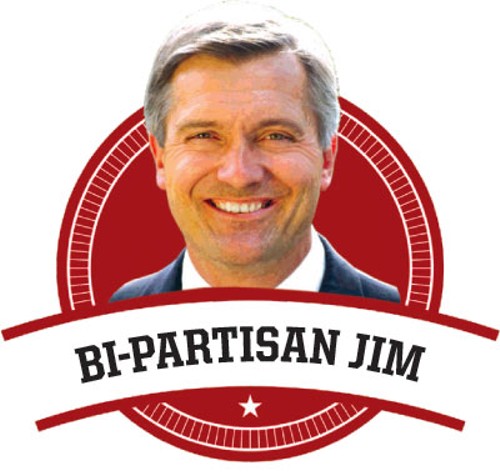Election Guide: Democrats Who Run With Elephants
In Utah, it isn't so easy to spot the difference between Republican and Democrats
By Eric S. Peterson @ericspetersonCandidates for office know that, ultimately, they’ve got to represent the people. And that generally means that Utah Democrats running for federal or state office would be labeled as right-wing wackos if they ran in more liberal environs like California. Despite doing the elephant walk this campaign season, a few candidates profiled below know how to show their progressive underbellies in just the right ways.
“Hi, I’m Bi. Bipartisan, that is.”
Jim Matheson
Democrat running for U.S. House, 4th District (against Republican Saratoga Springs Mayor Mia Love)
At a University of Utah forum in August, Rep. Jim Matheson comfortably and confidently delivered a talk before a room full of college students. But when the forum moved into a Q&A session, there was a faint look of fear in his eyes. Utah’s lone Democrat U.S. representative becomes a hunted political animal every two years come election time.
Luckily, with 11 years in office serving Utah’s 2nd Congressional District before making the jump to the newly formed 4th District, Matheson is wily game when it comes to controlling the message.
With only 10 minutes left in the forum, one student asked simply what committees Matheson sat on. For what could have been a 30-second answer, Matheson used up five minutes. After another softball question, the congressman was out of the forum and on to the next stop, successfully deflecting questions about where he stands with the Democratic Party platform.
But it’s hard to fault Matheson for wanting to control the message. With Saratoga Springs Mayor Mia Love raking in millions in out-of-state donations, backed by GOP rock stars like House Speaker John Boehner and GOP vice-presidential hopeful Paul Ryan, Love is giving Matheson a run for his millions of campaign dollars. A recent BYU poll put the two in a dead heat, each having 43 percent of the vote.
Matheson knows how to speak conservative-ese when talking about Democratic issues. He talks like a fiscal conservative. “I don’t think government should be running our economy,” Matheson said at the forum, in reference to keeping student-loan interest rates down. “We should look for policies that encourage good economic growth. That is our commitment as a country, to allow people to be able to improve themselves.” Great for people and great for the economy.
Matheson has worked hard to tout his personal bipartisan projects, such as a bill he’s co-sponsoring with Rep. Kevin Brady, R-Texas, to allow overseas U.S. companies to invest overseas profits in the United States without facing excessive taxes.
“It’s estimated we’ve got about $2 trillion of private-sector profits sitting offshore right now,” Matheson said. “Companies are waiting to see if we change our tax policy or not. I think we want that money back here, invested in the U.S.”
Matheson notes that another cause he’s been pushing for is echoed in the bipartisan talk from both President Barack Obama and Mitt Romney of reforming the tax code by lowering rates, broadening the base and cutting out unfair deductions.
Even still, Matheson has an uphill battle. His personal bipartisan politics still don’t obscure his record on hot-potato issues such as the Affordable Care Act. Matheson voted against the bill originally, then against its repeal in 2011 and then for its repeal in 2012. In flip-flop speak, that means Matheson was against it before he was for it, and prior to being against it again.
Matheson downplays this topic and boasts of his more obscure but significant bipartisan projects—the kinds of projects he says matters to average citizens rather than the party extremists. “Our political system is dominated by the shrill voices. But if you strip away the terms ‘Democrat’ and ‘Repubican’ and place [people] on an ideological scale ... you’ll find most people in this country, [we’re] rather centrist in our beliefs.”
Militant Moderate
Peter Cooke
Democrat running for governor against Republican incumbent Gov. Gary Herbert
For Peter Cooke, public service is about raising your voice for the sake of representation, not to whine. “I want my kids to see that I don’t just sit around the dinner table and complain,” Cooke says. Complaining doesn’t work for Cooke, and neither does complacency.
In another lifetime—before he was a businessman building affordable housing and before he was a two-star general for the Army Reserves—Cooke spent his late teens and early 20s in an idyllic Swiss Alps ski-resort community called Crans-Montana, working as a mountain-climbing guide.
“I had a chalet where I woke up every morning with a view of Zermatt, and I would get up and climb every day,” Cooke says. Cooke’s parents were in the travel industry, which meant he traveled the world and lived a decadent “jet-set” lifestyle. But once the United States entered the Vietnam War, the young expatriate learned how much animosity some in the world held for the United States. Cooke recalls hitchhiking from Switzerland to Venice and hearing a man say Americans were “savage” for allowing the assassination of President John F. Kennedy.
“When you see people hate you just because you’re American, it changes your perspective,” Cooke says. It was a feeling that shook Cooke from his reverie and motivated him to come home to the States and make something of himself. For a time, Cooke was torn between being a forester—he got his agriculture degree from Utah State University—fulfilling a full-time Army commission or joining the Peace Corps. Instead, he went to work for Frank Moss, Utah’s last Democratic U.S. senator. Orrin Hatch beat Moss in 1976.
Cooke made his own bid for Congress in 1978 and lost a narrow primary battle. After that, Cooke entered the private sector as a developer and later managed an affordable-housing company with 300-plus employees while also commanding a National Reserve battalion of as many as 10,000 reservists.
This election is Cooke’s first return to politics in 30 years. While he admits he’s a moderate and a fiscal conservative, he says there are stark differences between him and incumbent Gov. Gary Herbert.
For starters, while he doesn’t advocate same-sex marriage, Cooke supports statewide anti-discrimination protection for LGBT Utahns. He sees Herbert’s move to seize federal public lands as a “tactic,” instead of a solution, to distract from the state’s abysmal education funding. Cooke says Herbert has coasted on Utah’s economy—which was humming before he ever took office—but that his vision falters when it comes to education. Cooke points out that though the state has plans for funding state transportation projects decades into the future, the governor has no plan to move Utah even one rung up from the near bottom of the country in education funding.
Cooke has not offered specific plans on how he would revamp economic conditions or fund education—he doesn’t rule out a tax increase. He says he has the experience to lead on these issues, but needs to be in the governor’s seat first, a decision that’s up to voters.
“If [voters] want go on with the mediocrity of where we were, then, fine, we’ll wait until the economy comes back and throw a little money here,” Cooke says. “Or [voters] will say, ‘We want to be No. 1 in education, we want to be part of a global economy, we want to put public-private partnerships together’—this place would be so much more exciting. It would be so much busier in trying to evolve and educate ourselves instead of trying to find what makes us so different.”
It’s a Blend
Scott Howell
Democrat running for U.S. Senate against Republican incumbent Sen. Orrin Hatch
Old-school former state Sen. Scott Howell, D-Salt Lake City, was known as a Democrat who got things done through bipartisan work. So, is it a coincidence that a reporter calling on him at campaign headquarters finds him wearing not blue or red, but purple—all the way from his lavender tie to his purple pin-striped shirt to his cowboy boots with a dark-purple hue?
A Utah Democrat, Howell’s politics are likewise a blend. As a member of The Church of Jesus Christ of Latter-day Saints, Howell hews to his church’s stance on abortion and traditional marriage, yet he points out that his support for LGBT anti-discrimination laws have earned him the endorsement of Equality Utah. While Howell is not a supporter of Utah’s attempt to take back public lands, he does support an energy plan big on renewable sources but nuclear as well. The issue that separates Howell the most from his opponent, Orrin Hatch, the 36-year incumbent, is Howell’s ability to play nice with others to actually pass bipartisan laws. “[Hatch has] gone so far to the right, he has lost his moral compass on what it means to reach out and collaborate on solutions,” Howell says. “He’s now become part of the problem, not the solution.”
Bipartisan is a term most politicians throw around, but few have really lived and worked it. Howell, a Provo native, moved out of state early in his career for his work with IBM. He returned to Salt Lake City during the late ‘80s and found the state’s lagging education system cause enough to run for state Senate. The newcomer to the political scene beat a Republican incumbent, winning with 60 percent of the vote. He later survived re-election in a gerrymandered district running against an incumbent who was an LDS bishop. In two years, he became the minority leader. Howell committed to serve in the Legislature only for three terms and left in 2000. That’s also when he made his first run against Hatch.
During his time at the state Legislature, Howell says he learned how to work across the aisle and passed legislation to make kindergarten a compulsory part of the Utah education system.
Howell also recalls working on a bill with former Gov. Michael Leavitt to allow for digital signatures on certain government forms that would save taxpayer money and resources. “And this was back in the ’90s, when Al Gore was still inventing the Internet,” Howell says with a laugh. Even then, Howell saw the obstacle wasn’t the party across the aisle, but the extremists on the GOP fringe.
“When we passed this digital-signature [bill], we had the far right going on KTALK radio saying I wanted to put microchips in our kids’ heads so we could track them,” Howell says. “They really skewered us, but we passed it.”
Howell says being a bridge-builder meant learning how to simply get to know his conservative colleagues, including conservative firebrand Sen. Howard Stephenson, R-Draper. The two men exchanged books influential to their beliefs. Howell gave Stephenson Hillary Clinton’s It Takes a Village, while Stephenson lent Howell former appellate Judge Robert Bork’s Slouching Toward Gomorrah: Modern Liberalism & American Decline.
Howell envisions taking the same approach in Washington, D.C., as a moderate “Blue Dog” Democrat. Howell would make alliances with the right kinds of leaders, including “Red Dogs” like Scott Brown, R-Mass., who made waves by working to prohibit insider trading among members of Congress. He says alliances with likeminded members can effect change federally and improve the public’s perception of Congress, which he notes has a 10 percent approval rating. “Before Omar Qaddafi was killed, he had a 14 percent approval rating,” Howell says. “Think about that!”
By standing up to his party’s own whip, Howell believes he can represent Utah better than Hatch, who he says has become “ingrained” in the Beltway culture.
“I promise I will always vote my conscience, my constituents and the Constitution,” Howell says. “No party is going to tell me what to do and what not to do.”
Election Guide 2012:
More by Eric S. Peterson
-
The Secret Sauce
How Utah lawmakers disclose—or don't disclose—conflicts of interest.
- Feb 14, 2024
-
Police departments in Salt Lake County spent almost $20 million on civil rights complaints in the past decade
The Co$t of Mi$conduct
- Oct 18, 2023
-
Women decry harassment and toxic culture at St. George auto dealership
Men at Work
- Oct 11, 2023
- More »
Latest in Cover Story
Readers also liked…
-
Forget the family pedigree—Robert F. Kennedy Jr should not be the next president of the United States
Trojan Horse
- Jun 21, 2023
-
Women decry harassment and toxic culture at St. George auto dealership
Men at Work
- Oct 11, 2023








